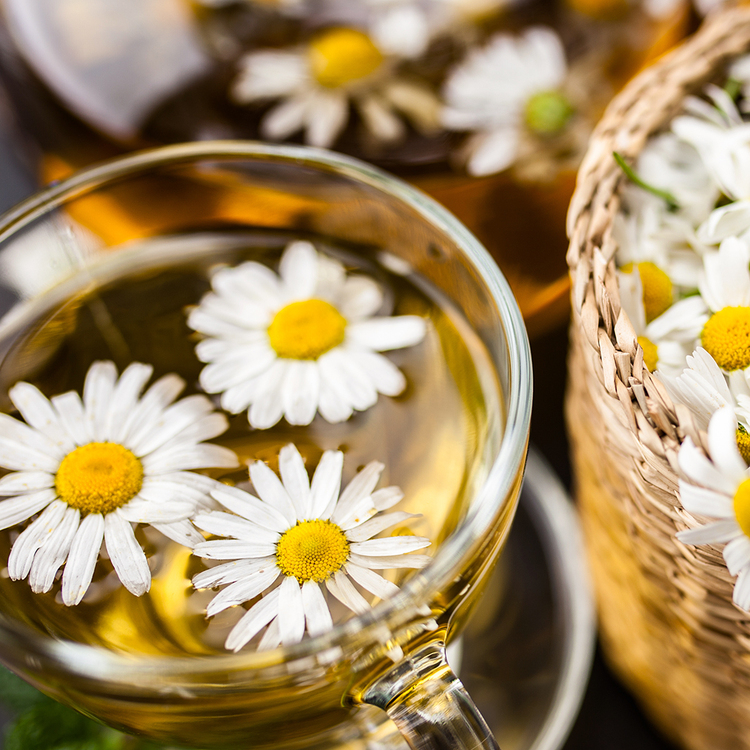There are some who hold the belief that specific tea varieties possess mystical or therapeutic qualities and chamomile is a tea that truly lives up to its reputation. The therapeutic and physiological benefits of chamomile tea include easing inflammation, promoting sleep and improving digestion. This soothing beverage without caffeine even contributes to heart health. And how reliable is its reputation as a calming beverage?
What Is Chamomile Tea?
Asteraceae is a family of flowering plants that includes chamomile, which looks like a tiny daisy when it's fresh. When dried, chamomile flowers can be used for herbal and natural therapies, such as making a delightful cup of chamomile tea. Chamomile flowers contain various powerful plant chemicals, such as flavonoids, sesquiterpenes, and other antioxidants. The chamomile plant's blossoms are dried and then infused with hot water to make tea. For generations, chamomile has been used to make restorative and calming chamomile tea and it is also regarded as a calming plant. Beneath its delightful flavor and perfume are some of its most notable and scientifically proven health.
Chamomile Tea Benefits
Chamomile Tea Contains The Antioxidant Apigenin, Which Promotes Better Sleep
Yes, chamomile tea is a great beverage to have after supper and before bed. Apart from its fragrant, floral-earthy taste and low caffeine content, it has been used medicinally for a long time and is well-known for its calming properties. According to Rachel Cheatham, PhD, adjunct assistant professor at the Tufts Friedman School of Nutrition Science and Policy, and founder and CEO of the nutrition consulting firm Foodscape Group, chamomile is a potent antioxidant. It has been possible to identify approximately 120 chemical components in chamomile, such as the antioxidant apigenin, which aids in binding brain receptors that induce sleepiness and lessen sleeplessness. Additional studies indicate that chamomile and lavender tea is particularly beneficial for new parents who are experiencing sleep issues. It has also been demonstrated that postpartum people who drink chamomile tea experience fewer symptoms.

Chamomile Tea Has Powerful Anti-inflammatory Properties
Because chamomile has a wide range of chemical components and antioxidants, it is an excellent beverage for reducing inflammation. Lower inflammation in the body lowers the chance of depression, autoimmune diseases, gastrointestinal discomfort, arthritis and a number of other chronic health problems.
Chamomile Tea Contains Heart-healthy Flavonoids
Flavonoids, one type of antioxidant found in chamomile tea, reduce the risk of heart disease, supporting heart health. Studies on flavonoids' ability to reduce blood pressure and cholesterol—including triglycerides and "bad" LDL cholesterol—have been conducted over the years. Regularly consuming chamomile tea can indirectly support the maintenance of healthy blood pressure levels by lowering stress, encouraging sleep and relaxing arteries and blood vessels. While chamomile tea has numerous potential heart health benefits, individuals on blood thinners may be at a higher risk of bleeding while consuming it.
Chamomile Promotes Relaxation By Alleviating Stress And Anxiety
Chamomile tea has the potential to be a very powerful stress and anxiety reliever because of its relaxing qualities and capacity to treat sleeplessness. Stress and insomnia are closely related, as many people are well aware. In a soothing bath or massage, chamomile tea (as well as its calming aroma) can be used as a natural sedative to assist in relieving soreness. Some study has indicated that this hot drink can effectively reduce symptoms of moderate to severe generalized anxiety disorder (GAD), albeit larger and more comprehensive studies are needed to confirm this finding. Recall that chamomile tea's quality and source are important factors in determining any potential health benefits. Potency and superior quality are preferred.
Read Also: A Guide to Making the Perfect Apple Slaw
Chamomile Tea Lowers And Regulates Blood Sugar Levels
While chamomile tea is not a one-to-one replacement for typical diabetes drugs or therapies, research has showed that it helps persons with diabetes maintain lower blood sugar levels as part of a balanced diet. Chamomile includes quercetin, an antioxidant affecting particular enzymes in the diabetic response. While further research is needed, a small-scale study conducted by Tabriz University of Medical Sciences in Iran evaluated 64 type 2 diabetes individuals aged 30 to 60. Half of the group drank chamomile tea for eight weeks with every meal, while the other half drank water. The chamomile group had significantly lower average blood sugar levels at the end of the two-month period.

Chamomile Contains Quercetin, An Immune-boosting Antioxidant
Concerning quercetin, this polyphenol (or plant molecule) has been shown to have antibacterial, antiviral and antimicrobial properties, which aid in immune system functioning and wellness. Quercetin has also been found to have promising anticancer qualities, such as reducing cancer cell viability and proliferation and disrupting cancer cell metabolic processes.
An Upset Stomach Can Be Smoothed With Chamomile Tea
Chamomile tea has anti-inflammatory, antispasmodic, and carminative qualities that aid in stomach lining calming and gas creation in the gut. A cup of chamomile tea may be an effective herbal cure for bloating, indigestion.
A Chamomile Tea May Help Relieve Pms Symptoms And Menstrual Cramps
Chamomile tea has anti-inflammatory, antispasmodic, and carminative qualities that aid in stomach lining calming and gas creation in the gut. A cup of chamomile tea may be an effective herbal cure for stomach distress, bloating, indigestion and abdominal gas.








